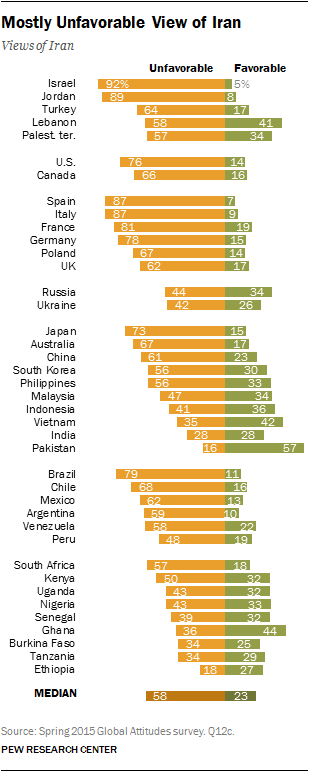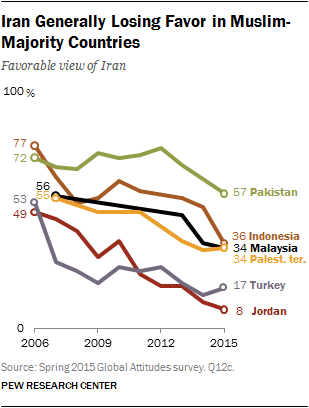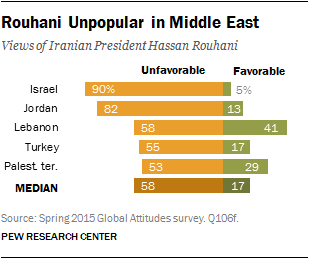
As the June 30 deadline for negotiations over its nuclear program approaches, a new Pew Research Center poll finds that attitudes toward Iran are mostly negative worldwide. Majorities or pluralities in 31 of 40 countries surveyed hold an unfavorable opinion of the Islamic Republic. And in several Muslim-majority countries in the Middle East and Asia, ratings have declined considerably in recent years.
June also marks the second anniversary of the election of Iranian President Hassan Rouhani, who generally receives low marks across the Middle Eastern nations polled.
These are among the key findings of a new survey by the Pew Research Center conducted in 40 countries among 45,435 respondents from March 25 to May 27, 2015.
Low Marks for Iran in Middle East, Other Regions
In the Middle East, roughly nine-in-ten Israelis (92%) hold a negative opinion of Iran, including nearly all Israeli Jews (97%) and more than six-in-ten Israeli Arabs (63%).
With the exception of Pakistan, publics in the Asia-Pacific region are either mixed or negative in their assessments of Iran. Unfavorable views of the Islamic Republic are especially widespread in Japan and Australia (73% and 67%, respectively). Even in Pakistan, opinion of Iran has somewhat soured, with negative ratings increasing from 8% to 16% over the past year.
Iran’s image also suffers in Latin America, where a median of 61% across six countries express unfavorable views. Publics in Africa, while negative on balance, are more mixed in their assessments of Iran. A median of 39% in nine African nations surveyed view Iran in a negative light, 32% view the nation positively, and a quarter do not offer any opinion. In Nigeria, attitudes differ among the predominant religious groups: 43% of Muslims express favorable views of Iran while only 23% of Christians hold that view.
Declining Ratings for Iran in Muslim-Majority Nations

Perhaps influenced by political and sectarian tensions in the Middle East, favorable views of majority-Shia Iran have declined precipitously in some Muslim-majority countries over the last decade.
Little Support for Rouhani in Middle East





